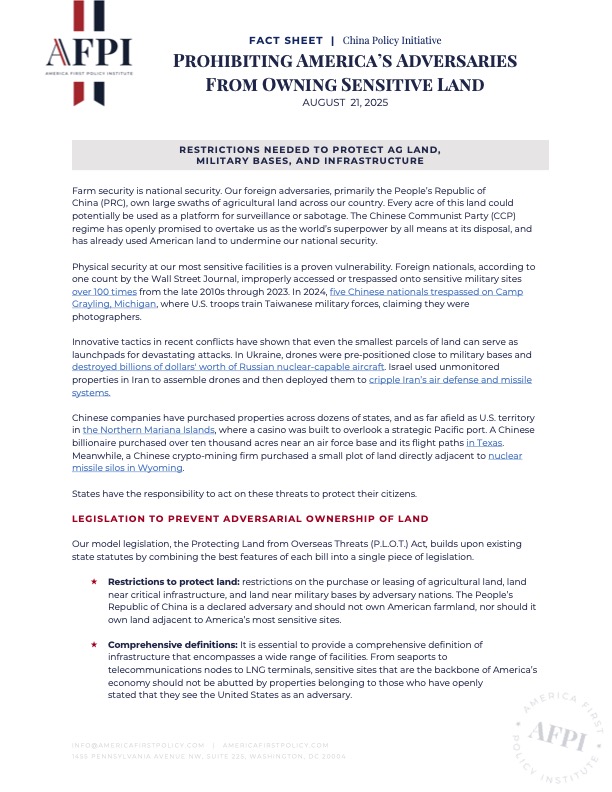Prohibiting America’s Adversaries From Owning Sensitive Land
Restrictions needed to protect AG LAND, MILITARY BASES, and INFRASTRUCTURE
Farm security is national security. Our foreign adversaries, primarily the People’s Republic of China (PRC), own large swaths of agricultural land across our country. Every acre of this land could potentially be used as a platform for surveillance or sabotage. The Chinese Communist Party (CCP) regime has openly promised to overtake us as the world’s superpower by all means at its disposal, and has already used American land to undermine our national security.
Physical security at our most sensitive facilities is a proven vulnerability. Foreign nationals, according to one count by the Wall Street Journal, improperly accessed or trespassed onto sensitive military sites over 100 times from the late 2010s through 2023. In 2024, five Chinese nationals trespassed on Camp Grayling, Michigan, where U.S. troops train Taiwanese military forces, claiming they were photographers.
Innovative tactics in recent conflicts have shown that even the smallest parcels of land can serve as launchpads for devastating attacks. In Ukraine, drones were pre-positioned close to military bases and destroyed billions of dollars' worth of Russian nuclear-capable aircraft. Israel used unmonitored properties in Iran to assemble drones and then deployed them to cripple Iran’s air defense and missile systems.
Chinese companies have purchased properties across dozens of states, and as far afield as U.S. territory in the Northern Mariana Islands, where a casino was built to overlook a strategic Pacific port. A Chinese billionaire purchased over ten thousand acres near an air force base and its flight paths in Texas. Meanwhile, a Chinese crypto-mining firm purchased a small plot of land directly adjacent to nuclear missile silos in Wyoming.
States have the responsibility to act on these threats to protect their citizens. Recent polling has shown that 82% of Americans are concerned about China specifically buying up our farmland and 78% express serious concern over foreign ownership in critical areas such as strategic military bases and critical infrastructure.
legislation to prevent adversarial ownership of land
Our model legislation, the Protecting Land from Overseas Threats (P.L.O.T.) Act, builds upon existing state statutes by combining the best features of each bill into a single piece of legislation.
- Restrictions to protect land: restrictions on the purchase or leasing of agricultural land, land near critical infrastructure, and land near military bases by adversary nations. The People’s Republic of China is a declared adversary and should not own American farmland, nor should it own land adjacent to America’s most sensitive sites.
- Comprehensive definitions: It is essential to provide a comprehensive definition of infrastructure that encompasses a wide range of facilities. From seaports to telecommunications nodes to LNG terminals, sensitive sites that are the backbone of America’s economy should not be abutted by properties belonging to those who have openly stated that they see the United States as an adversary.
- Federal cooperation: By granting specific exemptions for deals and acquisitions approved by the Committee on Foreign Investment in the United States (CFIUS), states can collaborate with the federal government to ensure that foreign purchasers who might not otherwise meet the necessary criteria will receive sufficient oversight.
- Grandfather clause and forfeiture: While requiring divestment or forfeiture would be ideal, experience shows that such features invite legal challenges. This model includes a grandfather clause that mandates the registration of any qualifying foreign-owned land with the state. This ensures the ability to put persistent pressure on those who already own such land, laying the groundwork to force divestiture or forfeiture of the land in the future.
- Residential exemptions: This legislation provides a residential exemption if the qualifying purchaser is both a lawful permanent resident and the property in question is not within a certain radius of any protected sites.
- Restrictions on third countries: Often, Chinese corporations seeking to buy strategic land will incorporate in “third countries” (e.g., the Cayman Islands) to dodge scrutiny. This legislation effectively closes that loophole.
NEXT STEPS
- If you are a state legislator or executive, a local official, or a responsible citizen wishing to raise this issue with lawmakers in your state, please click here for a copy of the model Protecting Land from Overseas Threats (P.L.O.T.) Act.
- The America First Policy Institute (AFPI) has state chapters across the country. Click here to see if there is an existing chapter in your state working to introduce and pass this bill in your legislature, or become a leader and get connected to AFPI to coordinate action in your state capital.
Easy to implement
This model legislation does not require large new bureaucracies or complicated reporting systems to ensure that information about land purchases by foreign adversaries makes it into the right hands.
Instead, reporting can easily be accomplished by piggybacking off of already existing reporting procedures required under the anti-money laundering provisions of the PATRIOT Act. Slight modifications to standard Customer Identification Program forms and forms already provided by a state’s real estate commission are all that is needed.
